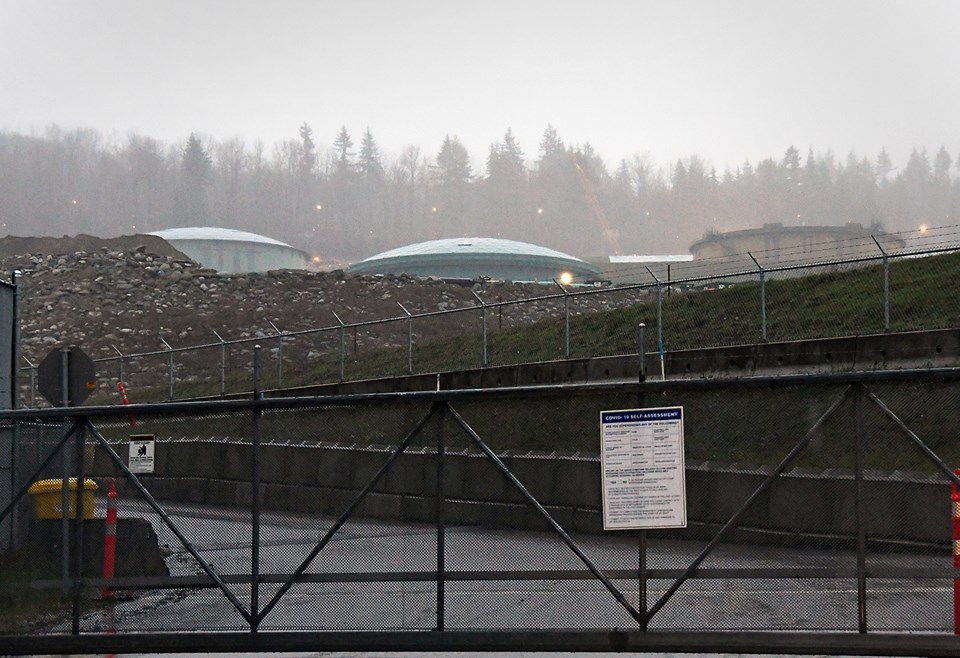After a decade of acrimony over the expansion of the Trans Mountain Pipeline and its two Burnaby terminals, the City of Burnaby and Trans Mountain have made a deal not to say bad things about each other in public anymore – "whether based on fact or opinion or otherwise."
The two parties signed a "community contribution agreement" Friday that will see Trans Mountain pay the city $20.1 million over the next 21 years to help enhance the city's emergency response program.
The signatories have also agreed to work together on emergency management, including "joint emergency management exercises, emergency procedures, protocols and mutual accountabilities."
"The completion of the Trans Mountain Expansion Project will extend the life of the Trans Mountain facilities in the city, and therefore the parties have an enhanced need for cooperation for safety and planning," states the agreement, released Tuesday.
After 10 years of publicly criticizing the expansion and expounding on the increased risk it presents for local residents, the city has also agreed to stop saying negative things about Trans Mountain or even bring up its past disputes with the company.
"Neither party nor its staff and consultants shall make, distribute or communicate in any way to any person any negative public communications, whether based on fact or opinion or otherwise, directly or indirectly, related to the other party, including any communication regarding past disputes," states the agreement.
The city's public opposition to the pipeline expansion, which tripled the capacity of the Burnaby Mountain tank farm, began in 2014 when Trans Mountain violated the city's bylaws by cutting down trees, drilling boreholes and operating heavy machinery without permission during its early field studies.
The dispute over the city's bylaws and whether Trans Mountain was allowed to ignore them went first to the National Energy Board (the energy regulator at the time), which ruled the pipeline company didn't need the city's consent to do its work.
In 2017, the B.C. Court of Appeal upheld the NEB's power to limit the enforcement of Burnaby's bylaws, and the city's appeals to the Supreme Court of Canada and Federal Court of Appeal were dismissed in 2018.
In 2015, then-mayor Derek Corrigan had vowed publicly to "lie down in front of a bulldozer" to stop the pipeline expansion.
During NEB hearings in 2017, Trans Mountain's lawyer Maureen Killoran said Corrigan's vocal criticism had created an atmosphere of opposition.
"He's in the newspaper, on the radio, he's everywhere. He's on the radio saying who's going to stand with me and stop the bulldozers?" Killoran said at a Dec. 4, 2017 hearing.
And Corrigan wasn't the only city official to speak out.
In 2015, then-deputy fire Chief Chris Bowcock released a damning report on the fire and earthquake risks posed by the proposed tank farm expansion, including the release of poisonous gas, explosions of molten crude and fires burning for days – all close to residential areas and Forest Grove Elementary School.
And over the past decade, Bowcock has criticized Trans Mountain for a lack of firefighting capacity, for not sharing its firefighting plans and for trying to sidestep the city's fire lane bylaw at the facility.
As late as this August, the city blamed Trans Mountain for holding up the release of a 2021 risk assessment and computer animation simulation of hypothetical disasters at the tank farm and marine terminal.
That report was released last month.
The new agreement won't restrict what Burnaby's mayor and councillors can say about Trans Mountain, but the agreement said the city "shall ensure that the councillors are aware of the provisions of this agreement" including the provision preventing staff from speaking out publicly against the company.
As part of the deal, the city is also required to "immediately" remove "all negative public communications about Trans Mountain, its operations, shareholders and affiliates" from the city's communications channels, including its website.
And if either party wants to issue a news release that references the other, they are required to send a copy ahead of time so they can "resolve any concerns, including those related to public safety."
Follow Cornelia Naylor on X/Twitter @CorNaylor
Email [email protected]



